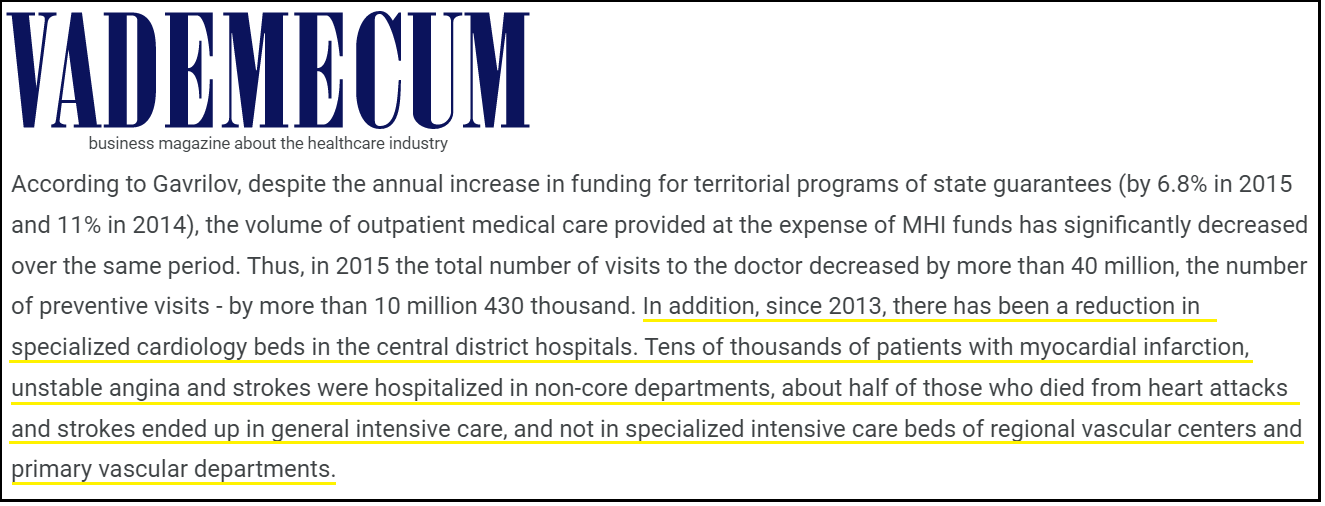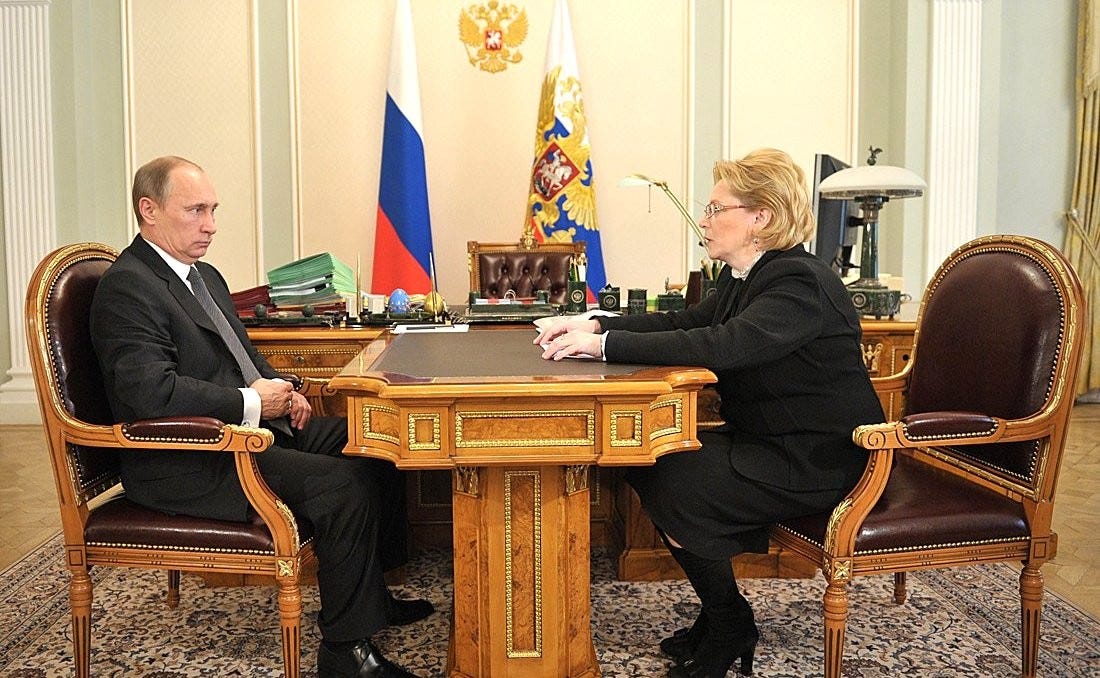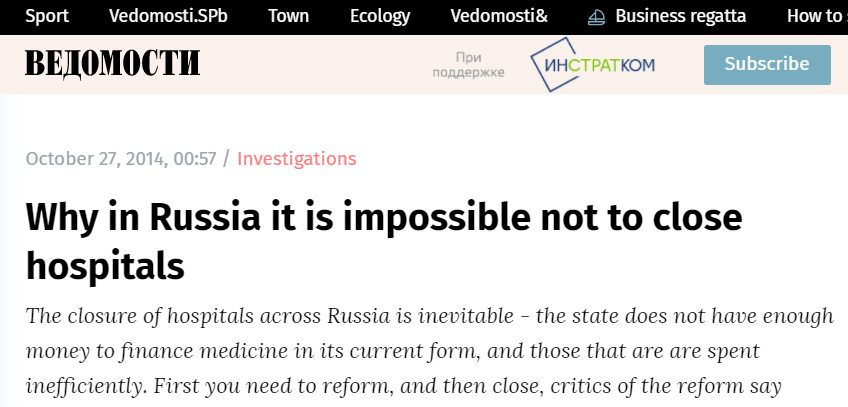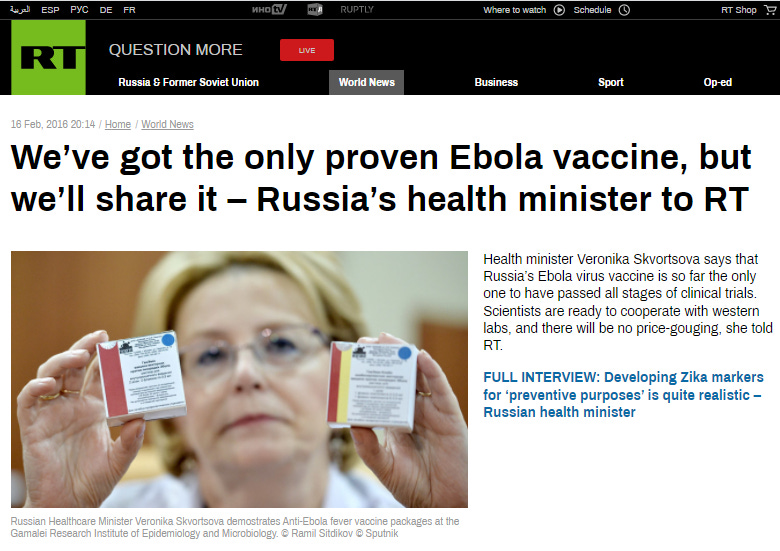The Bill Gates groupie who gutted Russia's healthcare system
Veronika Skvortsova shuttered hospitals while hyping unproven genetic injections
By Riley Waggaman, a former “senior editor” (newsroom errand boy) at RT
During her nearly eight-year tenure as health minister, Veronika Skvortsova presided over a series of awe-inspiring scams that maimed Russia’s healthcare system and set the stage for the current global clot-shot horror show.
Thankfully, after being removed from office as part of a cabinet shake-up in January 2020, Skvortsova was shipped to a Siberian gold mine for rehabilitation. Sigh—if only.
In reality, she was immediately appointed the head of Russia’s Federal Medical-Biological Agency (FMBA) and has spent the last two years hyperventilating about the existential threat posed by cold-like symptoms.
Shameless data manipulation, clot-shot shilling, and the manic debasement of healthcare—all of the charming “public health” measures we see today in Russia first took root a decade ago under Skvortsova’s degenerate reign. Very curious.
“A lie in the truest sense of the word”
Skvortsova’s appointment as health minister in May 2012 coincided with a series of decrees issued by President Vladimir Putin, which set ambitious targets for improving economic factors, housing, education, and healthcare in Russia. Decree No. 598 ordered the Russian government to “ensure” by 2018 a reduction in mortality from diseases of the circulatory system, the country’s top killer. A plan to combat cardiovascular-related ailments unveiled several years earlier also took on renewed urgency.
Putin’s proclamations had an immediate effect. Heart attacks and strokes began claiming fewer Russian lives—a very promising sign. At the same time, mortality attributed to nondescript “other causes” began to skyrocket—a very coincidental sign.
Emboldened by these early signs of success, the Russian government declared 2015 the Year of the Fight Against Cardiovascular Diseases. It was a bold move, particularly because there was a dangerous shortage of specialized hospital beds used to treat cardiac patients.
The outcome of this ambitious public health strategy was conclusive and incontrovertible: Skvortsova announced in February 2016 that mortality from cardiovascular diseases had plummeted by 16% over the past five years. It was of no particular importance that over the previous 12 months, only 12 of Russia’s 85 federal subjects had recorded a decrease in overall mortality that included fewer deaths from cardiovascular diseases as well as a reduction in fatalities from “other causes.” In Moscow and nine other regions, mortality from cardiovascular diseases decreased while overall mortality increased. Victory over heart failure was close at hand.

Regretfully, the initiative’s overwhelming success was soon besmirched by the federally-funded Russian Presidential Academy of National Economy and Public Administration (RANEPA). The institute released a report which stated that it was “necessary to analyze the correctness of statistical information coming from the regions and conduct a detailed analysis of mortality rates.” The document also called for greater accountability for officials who provide “false reports on the causes of death.”
Eventually, the obviousness of the scam became undeniable. In December 2018, Deputy Prime Minister Tatyana Golikova ordered regional governors to provide “a full justification” after it was determined that mortality from certain causes of death had been “underestimated.”
The health ministry, which had readily rubber-stamped the problematic figures, absolved itself of wrongdoing and said any issues with the data should be taken up with Rosstat, Russia’s Federal State Statistics Service. Despite its denials, Skvortsova’s ministry allegedly played an active role in the odious scheme, and even retroactively changed its mortality targets to better fit the fraudulent statistics to predetermined benchmarks.
The official acknowledgment of the scam created a sticky situation for the Russian government: who was to blame for all this nasty data manipulation? On October 14, 2019, Russian Prime Minister Dmitry Medvedev publicly accused the country’s regional governors of cooking their books.
“This is a lie in the truest sense of the word,” Medvedev said, referring to Russia’s phony mortality rates.
It was an impressive scam, but arguably not even Skvortsova’s best scam.
Infectious disease hospitals? Who needs those?
Within months of Skvortsova taking office, hospitals in Moscow began to vanish.
Doctors are protesting the closure of infectious disease hospitals in Moscow. They say that the staff of the infectious ward of City Clinical Hospital No. 4 has already received notices of dismissal, while doctors have been offered the positions of nurses and registrars. In addition, the bed fund of the liquidated building is listed as a reserve for patients in the event of particularly dangerous infections in the city.
The reorganization of the Moscow healthcare system will result in the liquidation of a number of hospitals and maternity hospitals… Employees of 28 institutions, including 15 hospitals, will be fired and the premises vacated.
To be fair to Veronika: the decision to shutter these medical facilities was made at the regional level. However, the health ministry defended Moscow’s “reforms.”
It made sense to close infectious disease hospitals because “citizens have become less likely to suffer from infectious and parasitic disease,” TASS reported in December 2015, relaying the health ministry’s opinion on the matter.
The “reorganization” of these hospitals came at a time when Russia’s healthcare system was under considerable financial strain. As Vedemosti reported in October 2014, Russian authorities—at the regional and federal level—apparently decided that “reforms” were needed in order to keep the system afloat.
It would probably be excessive to pin the blame solely on Skvortsova. But when you’re the health minister and hospitals around the country are getting choked out by neoliberal penny-pinching—that’s not really a “good look.”
Actually: some have argued Skvortsova’s health ministry played a key role in dismantling Russia’s healthcare, with predictable results:
“The problem as a whole is not related to COVID,” says the co-chairman of the medical trade union Andrei Konoval. “We have simply destroyed junior medical personnel as a category of workers.”
“On the eve of the pandemic, from 2013 to 2019, their number in Russia decreased by 64%—from 687 to 265 thousand. This is Rosstat data. The cuts were related to health care reform and the implementation of presidential decrees in May.”
So when you read about cold-like symptoms allegedly overwhelming Russia’s healthcare system, just remember: it’s probably not the cold-like symptoms causing the trouble; it’s probably the fact that Russia’s healthcare system has been systematically gutted, thanks in part to Veronika Skvortsova.
The original clot-shot shill
We’ll try to keep this section short and sweet: Skvortsova collaborated with Alexander Gintsburg and his world-famous Gamaleya Center on a fancy Ebola vaccine, using the same viral vector platform that later spawned Sputnik V.
She claimed it was an amazing success:
In truth, the drug was a complete dud. It was never submitted for approval outside Russia. It’s never been deployed in any meaningful way, anywhere. It was and continues to be a massive scam.
Skvortsova really shilled hard for this unproven genetic juice. In February 2016, she personally “presented” Gamaleya’s Ebola slurry to the World Health Organization as part of a marketing blitz.
Around the same time, Gamaleya’s director was already dreaming of all delicious rubles he was about to rake in:
Alexander Gintsburg, director general of the institute, was asked a question about the potential price of the future vaccine. He said naming an actual price would not be appropriate at the moment since the price does not only reflect the production cost which may vary hugely, but is also determined by the market in which the vaccine is sold.
On a question about who owns the intellectual property rights on those vaccines, Skvortsova said the vaccines have been patented in Russia and the exclusive Russian IP rights belong to Gintsburg and [Denis] Logunov.
By the way: Denis Logunov also played a key role in Sputnik V’s development.
A Bill Gates-linked creep? Yes.
Skvortsova sits on the Bill Gates-funded Global Preparedness Monitoring Board (GPMB). Fellow board members include Dr. Chris Elias, President of the Bill & Melinda Gates’ Global Development Program, and Anthony Fauci.
The GPMB, as Robert F. Kennedy Jr. wrote in his new book on Fauci, is a global committee of technocrats that promotes “subduing resistance, ruthlessly censoring dissent, isolating the healthy, collapsing economies, and compelling vaccination” as necessary antidotes to worldwide health crises.
Thanks for the memories, Veronika.










ツ
Thanks for posting my favourite video, ever.
Although a brick would have been more suitable, the pie worked well enough...
I think modern medicine was taken over by the Globalists a long time ago. Somehow, I didn't think it reached all the way to Russia. That is shocking. Thankfully we still have many good natural doctors. I follow Dr Berg on Youtube, he also has a Russia channel.